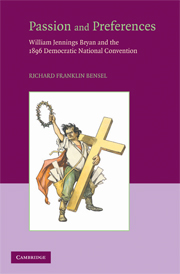Crossref Citations
This Book has been
cited by the following publications. This list is generated based on data provided by Crossref.
SKOWRONEK, STEPHEN
2009.
Mission Accomplished.
Presidential Studies Quarterly,
Vol. 39,
Issue. 4,
p.
795.
2010.
The Nationalization of American Political Parties, 1880–1896.
p.
1.
Klinghard, Daniel
2011.
ReadingPlunkitt of Tammany Hallin the Context of Late Nineteenth Century Party Nationalization.
Polity,
Vol. 43,
Issue. 4,
p.
488.
Barreyre, Nicolas
2014.
Les échelles de la monnaie: Souveraineté monétaire et spatialisation de la politique américaine aprés la guerre de Sécession.
Annales. Histoire, Sciences Sociales,
Vol. 69,
Issue. 2,
p.
439.
Calfano, Brian
2014.
Mediating Religion and Government.
p.
59.
Azari, Julia
and
Hetherington, Marc J.
2016.
Back to the Future? What the Politics of the Late Nineteenth Century Can Tell Us about the 2016 Election.
The ANNALS of the American Academy of Political and Social Science,
Vol. 667,
Issue. 1,
p.
92.
2017.
A Companion to the Gilded Age and Progressive Era.
p.
454.
Milkis, Sidney M.
and
Sparacino, Anthony
2017.
A Companion to the Gilded Age and Progressive Era.
p.
321.
Pastorello, Karen
2017.
A Companion to the Gilded Age and Progressive Era.
p.
284.
Tooze, Adam
2018.
“Cruelly Absent Grandeur”?.
Geschichte und Gesellschaft,
Vol. 44,
Issue. 3,
p.
466.
Ermakoff, Ivan
2019.
Causality and History: Modes of Causal Investigation in Historical Social Sciences.
Annual Review of Sociology,
Vol. 45,
Issue. 1,
p.
581.
Tarrow, Sidney
2021.
Movements and Parties.
Tharappel, Jay
2023.
Bimetallic Apartheid: British Imperialism and the Gold Standard.
International Critical Thought,
Vol. 13,
Issue. 3,
p.
461.
Doyle, Patrick
2023.
The Irish Land Question, the International Monetary Problem, and Archbishop William Walsh, 1881–1896.
The Historical Journal,
Vol. 66,
Issue. 1,
p.
141.





